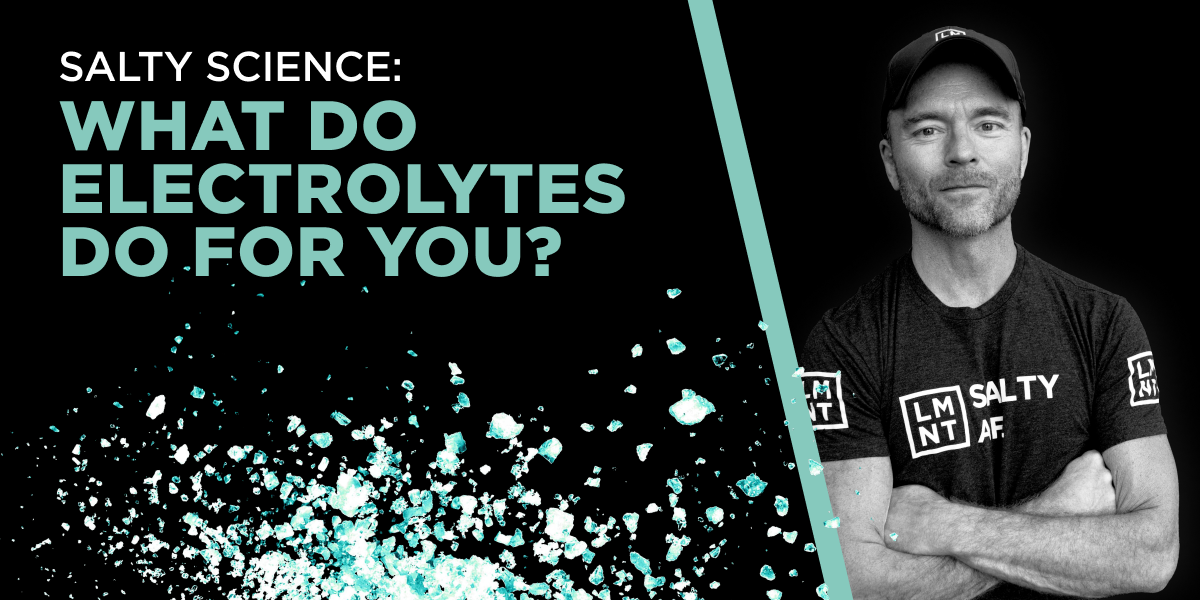What do muscle contractions, blood circulation, fluid balance, and your ability to read this very sentence have in common? They all depend on a short list of charged minerals called electrolytes. Without electrolytes, the perpetual flow of biochemistry couldn’t dance. It wouldn’t even know how to dance.
Much of the time you’ll catch me speaking to electrolytes’ role in hydration, particularly sodium. There’s a pervasive myth that drinking tons of water will magically keep you hydrated. In actuality, sodium is taking water out for a walk. Where sodium goes, water follows. But unwittingly, many folks are trying to walk 12 Great Danes at once — they’re drinking as if from a firehose, diluting blood sodium levels, and sending their fluid and electrolyte balance all out of whack.
My point is: In order to feel and perform your best, it’s crucial to consume electrolytes along with fluids. But hydration is just one chapter of the electrolyte story. Quietly, imperceptibly, electrolytes support the very processes that keep you alive. They help sustain life in beautiful harmony with your brain, heart, endocrine system, and more.
The Seven Primary Electrolytes
Electrolytes are minerals that conduct electricity when dissolved in a solvent (such as the fluids in and between your cells). The main electrolytes are sodium, chloride, potassium, magnesium, calcium, phosphate, and bicarbonate.
Of these seven minerals, only three (sodium, chloride, and potassium) are essential minerals whose primary functions in the body relate to their electrical properties. Magnesium, calcium, and phosphate serve essential purposes (like building bone and repairing DNA), but this has nothing to do with their electrical charge. Bicarbonate doesn’t need to be prioritized via diet because your body produces its own supply. And since people get adequate chloride whenever they consume enough sodium (salt = sodium chloride), I won’t spend much time on that electrolyte either.
That leaves sodium and potassium, the star-studded cast of today’s show. Sodium and potassium have two primary roles in the body: regulating fluid balance and enabling cellular communication. Much like peanut butter and jelly,it’s best not to leave either one out of your metaphorical sandwich.
You’re constantly losing electrolytes (especially sodium and potassium) through urine, waste, and sweat. To help your body function optimally, what’s lost must be replaced. Now, with the groundwork laid, we can cover fluid balance.
Electrolytes and Fluid Balance
Having the right balance of fluids in and around your tissues keeps your blood volume dialed in, heart beating properly, brain suspended in your skull, skin hydrated, and much more.
Fluid balance is mostly an unconscious process. If your body is in need of water, it secretes antidiuretic hormone (ADH) to retain what fluids are left. You stop urinating. Alternatively, if you have too much body water, your body stops releasing ADH so that you pee.
While fluid balance is largely unconscious, three adjustable factors influence this system:
- How much water you drink
- How many electrolytes you consume
- How much water and electrolytes you lose through sweat, urine, waste, etc.
The first factor is the easiest to knock out of the park because you have a built-in system for regulating fluid intake: thirst! Don’t ignore it, and you’ll consume enough water. Don’t drink past it — as many misguided athletes do — and you’ll avoid diluting blood sodium levels. It really IS that simple: Treat thirst as you would hunger.
The second factor requires the most conscious effort. Sodium regulates fluids outside of cells, while potassium regulates fluids inside of cells. Consequently, these are the most important electrolytes to prioritize for fluid balance. Potassium is the easier part: You can get most from your diet by prioritizing whole foods and leafy greens. Sodium’s the trickier one, because whole foods are naturally low in sodium. The solution? Stop avoiding the salt shaker and complement your diet with a well-formulated electrolyte drink.
The third factor is what you’re losing — and ideally, it’s also the sum of factors one and two. Your optimal electrolyte intake will vary depending on your diet and lifestyle. For active, healthy people, the latest science shows that optimal health outcomes occur at 4–6 grams of sodium and 3.5–5 grams of potassium per day. If you exercise, practice intermittent fasting, eat a low-carb diet, or some combination of these factors, you’ll likely need to increase your sodium intake beyond that baseline.
The neat thing about sodium intake is that you’ll feel the difference when you get it right. But that’s not all, folks! Allow me to introduce you to the sodium-potassium pump.
The Sodium-Potassium Pump
Every cell in your body requires energy in the form of adenosine triphosphate (ATP). And every day, a whopping 20–40% of a person’s ATP is used to pump sodium and potassium ions through cell membranes. This action — which keeps every animal on the planet alive — is controlled by the sodium-potassium pump.
The sodium-potassium pump wears many hats. It regulates brain cell activity, helps transport glucose and amino acids, preserves fluid balance, and keeps cells electrically charged for nerve impulses to fire.
I won’t spend any longer on the inner workings of sodium-potassium pumps. If you love that stuff—or want a safe and effective sleep aid—purchase a biochemistry textbook. For our purposes here, it’s sufficient to know that for every unit of ATP used, three sodium ions are pumped out of the cell and two potassium ions are pumped into the cell.
You need adequate levels of both electrolytes to keep those pumps running smoothly. But many healthy people don’t get enough sodium, and the vast majority of the larger population is short on potassium. Let’s get into the more tangible aspects of why electrolytes matter now — and why you’ll want to correct any deficiencies.
What Electrolytes Do For You
#1: Energy levels
Electrolytes are important inputs at the cellular level. Therefore, they affect the subjective feeling we call energy, even without providing calories.
Sodium and potassium, for instance, are essential contributors to proper fluid balance. Throw that balance off, and fatigue tends to follow. Not to mention, they feed sodium-potassium pumps, which allow nerve impulses to fire.
Sodium, potassium, and magnesium are also essential for cellular respiration. They help convert stored energy (food) into cellular energy (ATP). Short your body on electrolytes, and you short the system, leading to a perceivable decrease in energy.
To learn more, read the article: Do electrolytes give you energy?
#2: Exercise performance
Considering that sweat rates of over 1 liter per hour are very common, and that each liter of sweat contains over 800 mg of sodium on average, it should come as no surprise that sustained exercise greatly increases sodium needs.
Athletes exercising in the heat have been clocked at losing 7–10 grams of sodium in a single day. Can you imagine the detriment to these athletes if they adhered to the government’s blanket recommendation of 2.3 grams of sodium per day?
Unfortunately, this happens all too often. Since the symptoms of low sodium are so similar to that of dehydration, people unwittingly drink excess water, diluting blood sodium levels until the point of exercise-associated hyponatremia (dangerously low blood sodium levels). About 15% of elite endurance athletes experience the cramps, headaches, confusion, and brain fog of low blood sodium. Tragically, some have even perished.
To learn more, read the article: Performance hydration: The role of water, sodium, and glucose in exercise.
#3: Heart health
Sodium-potassium pumps keep your heart beating. Accordingly, deficiencies in sodium and potassium have each been linked to poor heart health outcomes.
When it comes to heart health, sodium is the most controversial electrolyte. According to a 2011 JAMA study, the sweet spot for heart health outcomes in patients with established heart disease or diabetes is around 4–6 grams of sodium per day. Yet the government continues to recommend we keep sodium intake below 2.3 grams per day.
Potassium is less controversial. Potassium deficiency is an obvious contributor to high blood pressure, which is a major risk factor for heart disease.
To learn more, read the article: Why electrolytes matter for cardiovascular health.
#4: Brain health
Sodium is especially critical for the health of your central nervous system — your brain. Deficiency can cause a host of not-so-subtle neurological symptoms, including headaches and brain fog. Push past sodium deficiency into sodium imbalance, and you’re in dangerous territory. For instance, clinically low sodium can cause cerebral edema (brain swelling).
#5: Mood
Your mood is also partially dependent on electrolytes. Millions of years ago, life itself began in the salty seas. As life evolved and ventured onto land, its need for salt persisted. Our ancestors who developed a sharp preference for salt outlived those who did not. In today’s times, salt deprivation has been shown to depress laboratory rats, making typically pleasurable things feel less rewarding.
Additionally, researchers have found that magnesium supplementation can help with both depression and anxiety. Potassium deficiency may also be linked to depression, and calcium deficiency — though uncommon — can cause fatigue, depression, anxiety, and irritability.
To learn more, read the article: Why your brain needs electrolytes.
#6: Immune health
Both sodium and potassium help maintain the electrical charge inside and outside cells. This membrane potential not only allows nerve impulses to fire, but also allows for the transmission of signals that direct your immune system.
Interestingly, potassium may also help to cool down unnecessary immune activity (AKA, chronic inflammation) by inhibiting a pathway called the NLRC4 inflammasome.
To learn more, read the article: Why electrolytes matter for immune health.
#7: Hormonal health
The relationship between electrolytes and hormones is a vast, largely unexplored universe. From what we know currently, here are a few examples of how they interrelate:
- Low sodium status increases stress hormones like cortisol, epinephrine, and norepinephrine.
- Sodium deficiency provokes the release of aldosterone, a hormone that raises blood pressure.
- Low thyroid hormones have been linked to low sodium and potassium levels.
To learn more, read the article: How electrolytes and hormones work together.
#8: Bone health
Many vitamins and minerals are involved in bone health. Calcium is the most renowned, of course, but I can’t mention calcium without noting that both vitamin D deficiency and phosphorus overload can impair our ability to bring calcium into bone.
Your body also requires sodium, potassium, magnesium, zinc, and vitamin K2 for optimal bone health. The bottom line is that you need adequate electrolytes (and other nutrients) to keep your skeletal system solid.
To learn more, read the article: How to improve bone density
Electrolytes Are Life
So there you have it: From keeping us hydrated to supporting our heart, brain, bones, hormones, and energy levels, electrolytes play an integral role in just about every facet of our existence. They’re the unsung heroes supporting the intricate dance of life — especially sodium and potassium.

